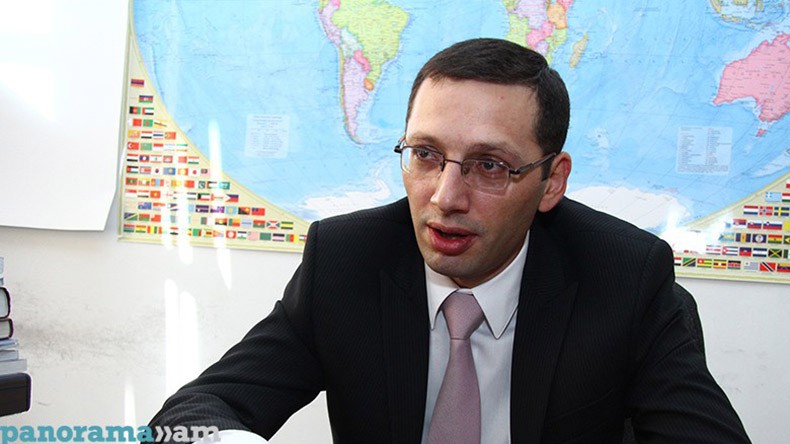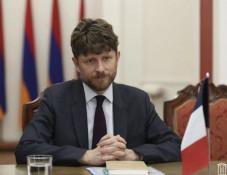
Turkey challenges Russia, puts NATO to new test: Comments by Armen Minasyan
In his comments to Panorama.am, political scientist Armen Minasyan analyzed the situation after Russian Su-24 jet was shot down by Turkey on November 24 near the Syrian border.
The expert recalled Russian President Vladimir Putin saying that the plane was downed by an air-to-air missile from a Turkish F-16 jet from Syrian territory and crashed in Syria 4 kilometers away from the Turkish border. The Russian president described the downing as a ‘stab in the back’ by accomplices of terrorists. A. Miansyan also recalled the remarks of Russian president’s spokesman Dmitry Peskov who said that Turkey’s actions are unexplainable.
“Turkey’s actions left no possibility of uncertainty: the further steps showed the Russian jet was downed in a demonstrative manner and the incident had a clear message,” the political scientist said.
Comments by Armen Minasyan:
A deliberate slap in the face
There is no doubt that Ankara’s actions were planned. Expert observations indicate that Russian planes carrying out military operations in Syria regularly violated Turkish airspace since the very first day of operations. Russia was forced to make airspace violations, and Turkey knew that. The fact is that Russian jets while taking off from Hmeimim airfield near Latakia to make sorties could in fact return to the airfield only by violating slightly Turkish airspace. Experts explained the fact by the direction of winds in the eastern Mediterranean during this season, which caused Russian jets to land at Hmeimim airport from the north of Latakia.
A map released by Turkey following the incident shows that although the downed plane carried out operations in Syria, it flew over a border area shaped like a cape 2 km wide that Russian planes regularly crossed. That is, Ankara knew that Russian planes usually violated Turkish airspace for a few seconds. Moreover, such violations were repeatedly reported. Moscow took responsibility for this, but the situation did not go beyond ritual diplomatic discontent. Russia was probably sure that Turkey’s behavior would not change in this respect so after the downing Moscow called the incident a ‘stab in the back’.
A video showing Russian Su-24 crashing down also proves that Turkey acted intentionally. Everyone understands that the downed plane crashed instantly and its filming could be a pure accident. The fact that the Russian jet’s crash was filmed and almost immediately released by Turkish media shows that a film crew prepared in advance was on the spot. Of course, the video could have been shot by militants on the ground, but it that case the crash would be accompanied by shouts ‘Allah is the greatest’, and secondly, in the video, the crashing plane moves away from the camera, rather than approaches it. Considering that the jet was flying from the Turkish border to Syria (which is also evident from the crash site), one can assume that the video was shot from Turkish territory.
The subsequent developments also indicate that Ankara’s actions were planned and demonstrative. They can be described as actions leading to an escalation. Thus, after the incident Turkey did not deem it necessary to get in touch with Russia, even though the latter kept silent for quite a while, probably awaiting that. Also, Turkey could declare that there was a misunderstanding and their protection facilities confused the Russian warplane with a Syrian one, etc. Instead Turkish Prime Minister Ahmet Davutoglu said that they shot down a Russian jet and they had the right to do so. Moreover, Ankara initiated a relevant procedure in NATO, handed a note to Russian diplomats, and a protest was staged outside the Russian trade mission in Istanbul. This can only be described as a slap in the face.
Emotions prevail
As already mentioned, Moscow initially showed extreme restraint (there was no official information about the incident until noon), and then, understanding the situation, President Putin, his spokesman, the foreign minister, and the chief of the General Staff of the Russian Armed Forces issued statements, followed by comments of various experts and politicians. The official messages of Moscow were harsh: in addition to expressing opinions, Moscow officially stated that Turkey supports terrorists, that Russian-Turkish relations will be reconsidered, that henceforth Turkey will be considered a more dangerous country than Egypt. Russian Foreign Minister Sergei Lavrov cancelled his visit to Turkey.
Unlike harsh and ambiguous official statements, the so called public opinion in Russia turned out to be extremely emotional. One after another, travel agencies announced their plans to stop sales of vacation packages to Turkey, while local experts voiced opinions ranging from calls to punish Turkey to statements about the start of WWIII. Many statements contained a thesis to punish Turkey ‘through Armenians and Kurds”.
Anyway, there is still no clarity about how exactly Moscow should react to what has happened. There is no question that Moscow has to react. The point is that although Moscow is trying to explain the incident by business interests of Turkish President Erdogan (Erdogan’s son is allegedly involved in oil business of ISIS via Turkish territory, while Russia’s actions hinder that), in reality the step of Turkey was obviously aimed at “showing Russia its place”. When V. Putin announced the Retaliation Operation after the crash of Russian A321 plane over Sinai, he vowed to punish all those guilty, regardless of where they are.
Leaving aside emotions, it is just a superpower’s bid for self-affirmation, according to which Russian will henceforth consistently protect the interests of its citizens wherever they are. Yet, with its overt and ostentatious actions, Turkey challenges Russia, and there are two possible scenarios here: either Moscow will accept the challenge and resort to an escalation with quite predictable and sad consequences or it will swallow its pride after that slap in the face and accept the fact that Russia is not a superpower.
Naturally the second scenario is less likely, and Putin’s reaction already demonstrated that he accepts the challenge. On the other hand, the first scenario is quite dangerous. Turkey is a NATO member and protected by NATO’s security shield, and Ankara counts on this circumstance. Russia is aware of that and now it has to choose the proper retaliation tool to be used in practice.
NATO faces test
Turkey’s actions pose quite a serious challenge to NATO as well. Although some NATO members and NATO Secretary General Jens Stoltenberg initially used in their statements a wording indicating their solidarity with Turkey, their subsequent remarks and actions show that NATO is not inclined to get fully involved in that spat.
Anonymous US sources said that Washington determined that the Russian jet was downed over Syrian territory, and then anonymous sources of Brussels said that the Secretary General of NATO expressed his personal opinion, and not NATO’s position.
It is so understandable: after the Cold War, NATO is looking for new missions, and despite loud statements about democracy, human rights and security, it becomes clear that NATO member states today have little in common in terms of challenges and threats and the number of those common interests is declining. Under such conditions, it would be wrong for Ankara to expect unconditional support.
This may be the reason that NATO members, in addition to cautious messages of solidarity, mainly urged Moscow and Ankara to begin a dialog. The absence of contacts, let alone an escalation of the situation, may become a real headache to NATO and even a visual proof of its incapacity.
After all, one should understand that in a hypothetical situation of worsening relations between Russia and NATO, it is Eastern European countries, rather than the U.S. and Turkey that would feel the greatest fear.
It is hard to imagine, for example, Estonia or the Czech Republic, risking their physical security for Syria’s interests or the geopolitical interests of Moscow and Ankara.
In this situation, NATO partners will most likely cause Ankara to make public concessions and they will urge Russia to exercise more restraint.
Newsfeed
Videos






























